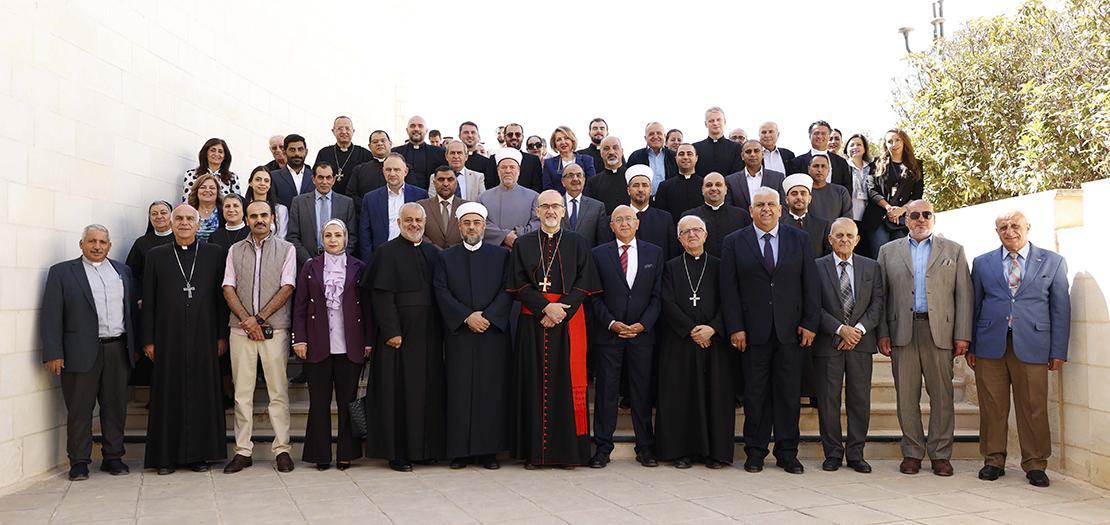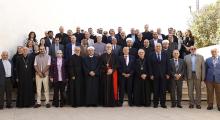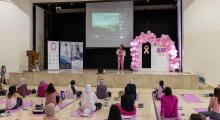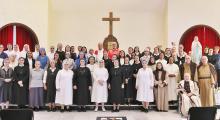Issued by the Catholic Center for Studies and Media - Jordan. Editor-in-chief Fr. Rif'at Bader - موقع أبونا abouna.org

On Monday, October 20, 20225, the Catholic Center for Studies and Media (CCSM), in cooperation with the American University of Madaba (AUM), held a symposium marking the 60th anniversary of the issuance of the document "Nostra Aetate" which was issued by the Second Vatican Council in 1965. This document opened broad horizons for interfaith dialogue and the enhancement of mutual understanding.
During the symposium, addresses were made by His Beatitude Cardinal Pierbattista Pizzaballa, Latin Patriarch of Jerusalem and member of the Vatican's Dicastery for Interreligious Dialogue, and Imam of the Hashemite Royal Court His Eminence Dr. Ahmad Al-Khalayleh. The symposium was also attended by Madaba Governor Hassan Al-Jbour, a number of bishops, priests, nuns, and Islamic clerics from the Department of the Chief Justice, the Iftaa Department, and the Ministry of Awqaf and Islamic Affairs, in addition to heads of religious departments in the governorate and AUM students.
In his major address, His Beatitude Cardinal Pierbattista Pizzaballa thanked the CCSM and the AUM for organizing this symposium marking the 60th anniversary of the issuance of the Vatican Document "Nostra Aetate" while stressing its historic importance in opening a new chapter in the relations between Muslims and Christians based on mutual respect and faith in the one God.
His Beatitude pointed out that while Middle Eastern societies' awareness of this document remains limited and outside the academic and religious circles, yet its spirit and content are embodied practically in the dialogue and common living initiatives that emerged in the region, most notably those of the Hashemite Kingdom of Jordan under the leadership of His Majesty King Abdullah II, who made dialogue and peace a basis for Jordan's regional and international mission.
The Cardinal reflected on what he referred to as the “bright models” that embody the document’s mission which state that dialogue is not a mental luxury but rather a vital necessity for the lives and stability of peoples; while referring to the global Jordanian dialogue initiatives including the Amman Message, the Common Word Initiative, and the World Interfaith Harmony Week, in addition to the Hashemite Custodianship of religious sites in Jerusalem, and several national institutions operating in the field of dialogue in Jordan.
His Beatitude stressed that interreligious dialogue is “pilgrimage towards hope and trust-building” noting that it is not limited to a rereading of history and past relations between communities, but necessitates instilling the culture of encounter in education and religious institutions, and fostering cooperation among religious leaders in the face of divisions and conflicts especially the horrific tragedies witnessed in the region the last of which being the Gaza War.
Cardinal Pizzaballa concluded by emphasizing that peace in the Middle East begins with attaining genuine dialogue among followers of religions, while emphasizing that Christian communities, like all other communities in the region, constitute an integral part of this land, and that the relationship with them is vital for building the future. He continued that the Christian-Islamic relationship is essential for the region's integration into the wider world and for confronting the global challenges that affect everybody.
In another address, CCSM Director Fr. Dr. Rif'at Bader noted that the symposium was not intended to reflect on the past, but rather to look to the future. He stressed that Jordan has always been a pioneer in launching initiatives for dialogue and cooperation between Muslims and Christians since the 1980s, while being vibrant in the fields of common living and respect for religious diversity.
Fr. Bader expressed hope that this annual anniversary would contribute to raising new generations who heed the path of His Majesty King Abdullah II Ibn Al Hussein with regards to enhancing a culture of dialogue and peace, while considering dialogue seriously, so as to be able to continue to mark success stories with testimony to Jordan's procession on the path to peace, societal harmony, while promoting the shared values between the Islamic and Christian faiths.
For his part, AUM President Professor Mamoun Akroush expressed AUM's pride in hosting this important meeting at a time when the world is encountering numerous challenges that call for deeper understanding and cooperation among people of diverse religious and cultural backgrounds. He stressed that the AUM's hosting of this symposium in Madaba embodies its unwavering commitment to dialogue, openness, and building bridges among cultures and religions.
He continued that the Church, since its early days and up to this moment, has been a spiritual and humanitarian voice and an oasis of peace that welcomes all peoples in a spirit of respect, openness, and acceptance, while viewing religions and their followers with appreciation through participation in the moral and spiritual values that unite humanity. He concluded by noting that the Church plays a pivotal role in deepening mutual understanding and working jointly for the attainment of social justice, the common good, and lasting peace among peoples.
For his part, Dr. Ahmad Al-Khalayleh said that the relationship between God and humankind is unique and nonpareil, while being based on a profound association and constant need for the Creator. He pointed out that whoever seeks to know the Almighty God with His sublime qualities must know humans in their weakness and need for God.
He called for attaining human communication in the best possible way, namely in word and deed, and with respect for others, emphasizing that faith does not mean holding identical beliefs, but rather adhering to the right of others to believe, because God created humankind differently so that they may reflect on His creation and seek Him through this existence.
He valued Jordan's pioneering initiatives in the field of interfaith dialogue, such as "the Amman Message, "A Common Word between Us and You" Initiative and the Interfaith Harmony Week, in addition to Jordan's model of common living and its welcoming of the displaced people from Mosul. He added that these initiatives manifest Jordan's mission, under the leadership of His Majesty King Abdullah II, with regards to promoting peace and respect among humankind and defending the just humanitarian causes, foremost among which being Jerusalem and its holy sites.







